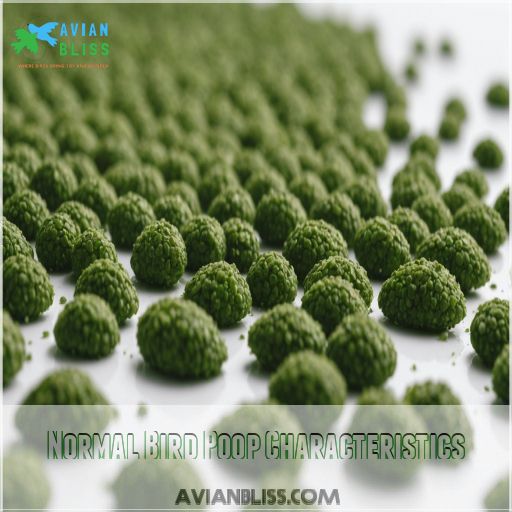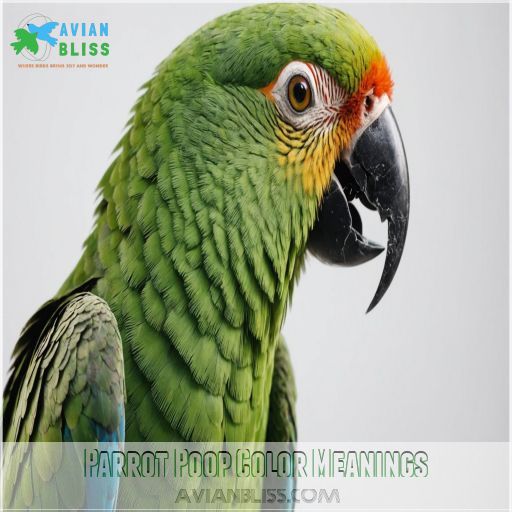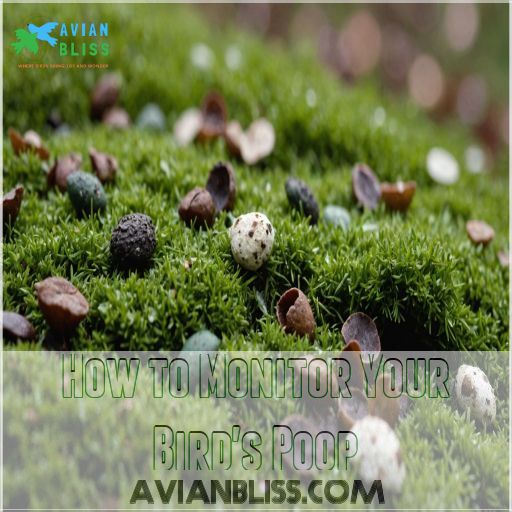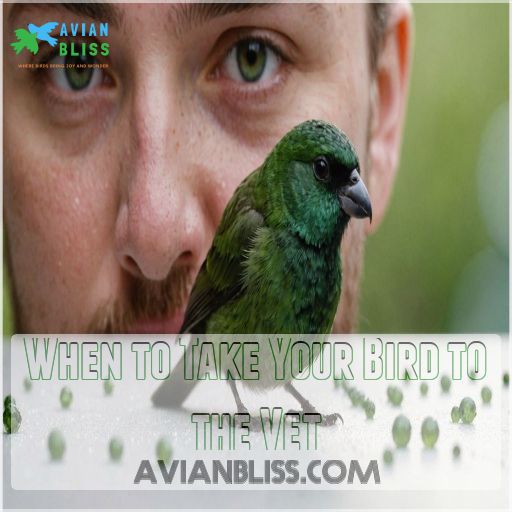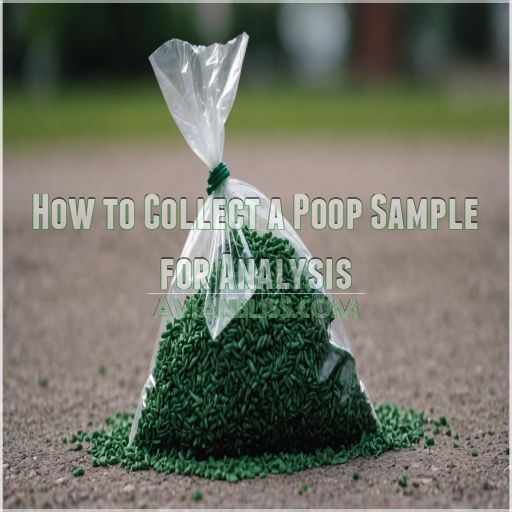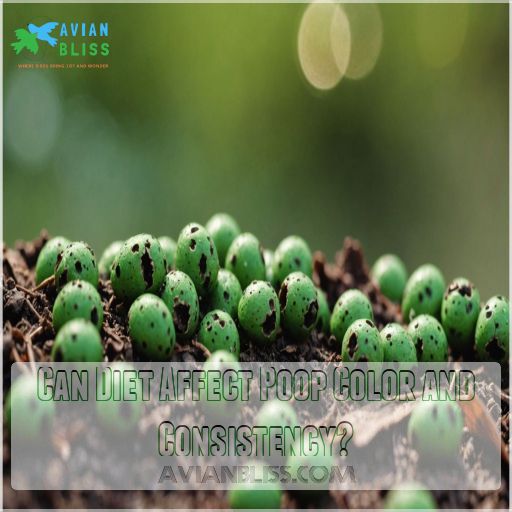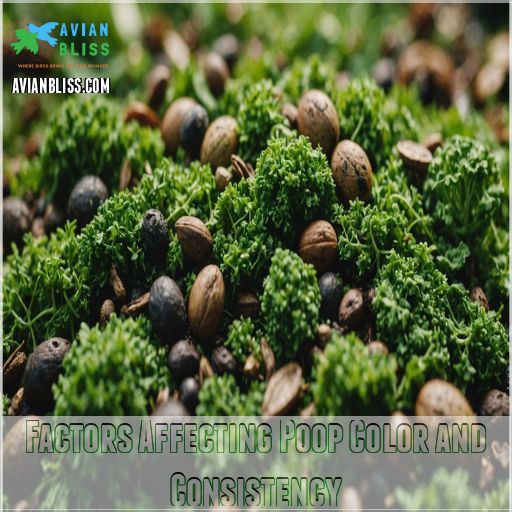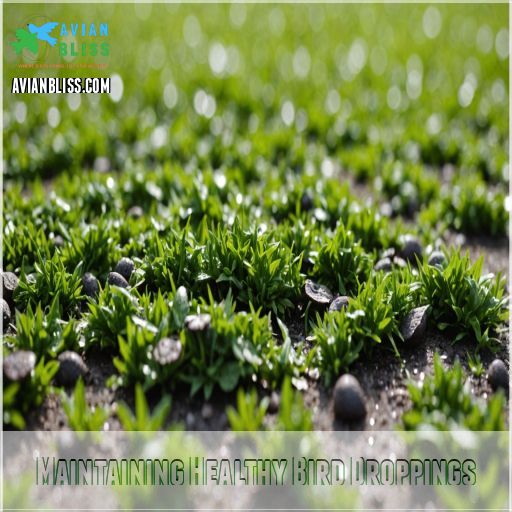This site is supported by our readers. We may earn a commission, at no cost to you, if you purchase through links.
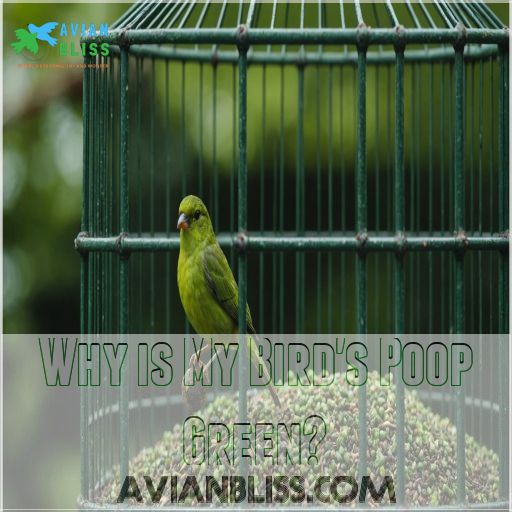 If your bird’s poop is green, don’t flap your wings in a panic just yet! It could be as innocent as munching on leafy greens like kale, spinach, or broccoli, which are known to tint droppings green.
If your bird’s poop is green, don’t flap your wings in a panic just yet! It could be as innocent as munching on leafy greens like kale, spinach, or broccoli, which are known to tint droppings green.
However, it can also indicate health issues like liver disease or infections such as Chlamydiosis, commonly known as Parrot Fever.
Keep an eye on the consistency and odor too. If there’s more than meets the eye or a drastic color change, a vet visit is wise.
Staying alert to poop clues helps your feathered friend stay in fine fettle. Curious about more poop insights? You’re in the right place!
Table Of Contents
- Key Takeaways
- Normal Bird Poop Characteristics
- Why is My Bird’s Poop Green?
- Parrot Poop Color Meanings
- Common Causes of Unhealthy Droppings
- How to Monitor Your Bird’s Poop
- When to Take Your Bird to the Vet
- How to Collect a Poop Sample for Analysis
- Can Diet Affect Poop Color and Consistency?
- Factors Affecting Poop Color and Consistency
- Maintaining Healthy Bird Droppings
- Frequently Asked Questions (FAQs)
- Why is my bird poop Green?
- Why is my poop in the color of turmeric?
- Is green poop bad for birds?
- Why is my parakeet poop Green?
- Why is my bird’s poop green?
- Is green bird poop normal?
- Should I be concerned if my bird’s poop is green?
- Can I change my bird’s diet to prevent green poop?
- What other factors can affect the color of my bird’s poop?
- How often should I monitor my bird’s poop?
- Is green poop healthy for birds?
- What causes green stool in birds?
- Why is my parakeet pooping green?
- What does my birds poop look like when it’s sick?
- How can I prevent my birds poop from turning green?
- What nutrients are lacking if my birds poop is green?
- Is green poop a sign of a healthy diet in birds?
- How long should I monitor green poop before seeing a vet?
- Can green poop indicate an underlying medical condition in birds?
- Conclusion
Key Takeaways
- If your bird’s poop has turned green, don’t freak out; it might just be their diet pulling a fast one. Leafy greens like kale and spinach can give droppings a grassy hue, so remember, sometimes their meal plan is an artist with a green palette.
- Keep an eagle eye on sudden color changes. Green poop can sometimes be a red flag signaling liver issues or infections. Quick shifts in shade mean it’s time to grab your magnifying glass—or better yet, phone the vet for a closer look.
- Bird poop isn’t just nature’s art; it’s a health diary. A healthy poop should have a soft, paste-like texture and little odor. A funky smell or watery consistency could hint that it’s time for a wellness check-up.
- Regular poop monitoring helps you spot these colorful clues early. Your bird’s droppings can reveal secrets about their health, and with a little vigilance, you’ll be able to catch any storm clouds on the horizon well before they rain down.
Normal Bird Poop Characteristics
Understanding your bird’s poop is like reading a feathery fortune cookie – it gives you clues about their health.
Typically, bird droppings come in a variety of colors, but all should have a soft, consistent texture and nearly no odor.
Color Variations in Bird Poop
Let’s talk about bird droppings, shall we?
In the realm of avian droppings, color variations can spin quite a yarn.
A poop color chart might show you that bright red poop stems from berries, but unexpected changes could signal health issues.
Monitor their diet’s impact closely!
Texture and Consistency of Healthy Poop
Ideally, your bird’s poop should have a soft, paste-like consistency – not too dry or watery.
This indicates a healthy digestive system.
Keep an eye on the texture, as changes can signal potential issues.
Consistency is key for your feathered friend’s wellbeing.
Odor and Liquid Presence in Droppings
Healthy bird droppings should have little to no odor and contain a white, pasty liquid known as urates.
When checking droppings, remember these key points:
- Poop odor: Should be minimal.
- Liquid consistency: Notice balanced volume.
- Urates: Creamy and white.
Size and Shape of Bird Droppings
Now, let’s talk about the size and shape of bird droppings.
Typically, poop size varies by species; something’s fishy if a budgie leaves a parrot-sized gift.
On the poop chart, normal shape is cylindrical.
Irregular shapes or sizes could signal illness, making poop analysis very important for bird health.
Why is My Bird’s Poop Green?

If you’ve noticed your bird’s poop has turned green, don’t panic just yet; green poop can be perfectly normal depending on their diet.
Sudden changes, however, might signal a health issue that needs a vet’s attention.
Diet Influence on Poop Color
Your bird’s poop color can vary depending on their diet and what they eat. If your feathered friend is munching on lots of veggies and seeds, their droppings may take on a greenish hue. This is perfectly normal and nothing to worry about. Just keep an eye out for any sudden, unexplained color changes that could signal an underlying health issue.
- Vegetables like kale, spinach, and broccoli can turn poop green
- Seeds and grains in the diet also contribute to green-tinged droppings
- Certain food dyes or supplements may temporarily alter poop color
- Drastic color shifts could indicate liver disease, bacterial infections, or other problems
- Monitor poop regularly to spot any concerning changes in color or consistency
Normal Bird Poop Characteristics
Vegetables and Seed Diets Causing Green Poop
Ever find yourself wondering, "Why is my bird’s poop green?" Well, don’t panic just yet! Green poop can be a result of your feathered friend munching on a veggie-rich or seed diet. Think of it as their own customized coloring book.
Keeping an eye on diet impact through fecal analysis helps ensure bird health.
If you’re worried, consult an avian veterinarian for reassurance.
Health Issues Indicated by Green Poop
You’ve swapped seeds for greens, but there’s still something green you didn’t plan for—your bird’s poop.
While a veggie-rich diet can lead to green poop, unexpected health woes might be lurking.
Watch for liver disease or GI infections, lurking like unseen bandits causing trouble.
Green urates or electrolyte imbalances could signal internal parasites or bacterial infections, waving a red flag for vet attention.
Parrot Poop Color Meanings
Understanding parrot poop colors can feel like unraveling a mystery, but it’s a fun and essential way to keep an eye on your feathered friend’s health.
While light green might signal everything’s A-OK, other shades like pea green, yellow, or red could mean it’s time for a vet visit.
Light Green Poop in Parrots
Olive green poop or slight variations are generally normal in parrots.
This color is often a result of their vegetable and seed-heavy diets.
However, keep an eye out for any sudden changes, as light green droppings could also signal liver disease or stress.
If you notice concerning shifts, don’t hesitate to consult your avian vet.
Pea Green or Lime Green Poop Implications
Noticed your parrot’s poop looks pea green or lime green? It’s like a traffic light warning you to stop and check. Possible culprits:
- Liver Disease: Troubles in the liver can change poop color.
- Chlamydophila Psittaci Bacteria: These sneaky critters cause infections.
- Diet Changes: Sometimes, sudden menu swaps are the villains.
- Anorexia or Dehydration: Eating less or drinking sparingly affects color.
Consult your bird vet for a fecal test to identify issues.
Yellow, Red, and Black Poop in Parrots
While green droppings are common, sudden shifts in color can signal serious problems.
Yellow parrot droppings might suggest liver disease, often related to diet impact.
Don’t brush off red or black poop; they could hint at potential blood in poop, requiring emergency care.
Unfortunately, smelly parrot poop isn’t a laughing matter either—it demands immediate poop analysis for the bird’s health and safety.
Common Causes of Unhealthy Droppings
Understanding why your bird’s poop is green might be as puzzling as solving a mystery, but it’s important for their health.
Common causes include bacterial infections, parasites, fungal issues, and even metal toxicity, so don’t ignore these colorful clues!
Bacterial Infections and Poop Abnormalities
If your bird’s poop suddenly turns brown and smells foul, it could signal a bacterial infection like Salmonella, E. coli, or Campylobacter.
Don’t panic – with prompt vet care and proper treatment, your feathered friend can recover.
Keep an eye out for other signs like diarrhea, and address any underlying causes to restore their healthy, odor-free droppings.
Parasites and Fungal Infections in Bird Droppings
After understanding bacterial infections, let’s move on to parasites and fungal infections—common culprits of green bird poop.
Identifying symptoms like undigested food in droppings or unexplained weight loss helps in bird poop safety and prevention.
Imagine tiny gremlins causing tummy trouble!
Maintain bird poop hygiene by cleaning cages regularly.
Treatment usually involves vet-prescribed medications.
Remember, prevention and vigilance are key to healthy feathered friends.
Viral Infections and Heavy Metal Toxicity
You might have thought parasites were enough trouble, yet viral infections and heavy metal toxicity bring their own bag of woes.
Picture your bird with a top hat but feeling under the weather. Heavy metal toxicity, or heavy metal toxicosis, can flip colors to purple or black. Viral infections create a rainbow of health hiccups.
Treatment options and prevention tips restore peace and pretty poop hues.
How to Monitor Your Bird’s Poop
Checking your bird’s poop is like reading a daily health diary; it’s how you spot those early signs of illness before they become serious.
Don’t miss those colorful clues—whether it’s a surprise green tint or an unpleasant smell, paying attention to your bird’s droppings can keep you a step ahead in guarding their health.
Frequency and Consistency of Poop
Monitoring your bird’s poop frequency and consistency is super important for their health.
Look for changes in volume, shape, and texture.
Is it coming out less often? More liquidy? Dry and chalky?
These shifts could signal issues like digestive problems, dehydration, or even egg binding.
Stay vigilant – your bird’s droppings are a window into their wellbeing.
Odor and Abnormalities in Urates and Urine
Checking your bird’s poop isn’t glamorous, but it’s like reading tea leaves for your feathered friend’s health.
Notice the urates? They should be white and creamy, while the urine stays clear.
If the odor smacks you in the face, or colors like yellow appear, something’s amiss. Odor intensity and abnormal urates hint at issues like diabetes or ulcers.
Why’s your bird’s poop green, though? Keep an eye out!
Signs of Illness or Disease in Bird Droppings
Now that we’ve sniffed out odor changes in urates and urine, let’s talk about your bird’s health signs.
If you notice poop color changes, odd dropping consistency, or a change in poop frequency, it might mean something’s up.
Picture your bird as an artist, and its droppings as little self-portraits. When the art style changes drastically, it’s like a yellow flag indicating potential concerns.
When to Take Your Bird to the Vet
Your bird’s poop can speak volumes about its health, so it’s really important to know when a vet visit is needed.
If there’s no poop for 12 hours or you see significant blood, it’s time to spread those wings and rush to the vet!
Emergency Care for Unhealthy Droppings
If your feathered friend’s poop looks concerning, don’t panic – but do act fast.
Sudden color changes, excessive straining, or lack of droppings altogether warrant an immediate vet visit.
These could signal serious issues like infections, blockages, or toxicity.
Your vet can run tests and provide the right treatment to get your bird back to their chirpy self.
No Poop or Significant Blood in Droppings
After tackling emergency care, it’s time to chat about those poop-less days or when your bird’s droppings channel a horror movie with significant blood presence.
It’s not just the blues; big red flags like these scream for a vet visit.
Reasons like diet changes or internal blockages cause no poop.
Poop analysis becomes the Sherlock Holmes here; uncover the mystery behind blood causes.
Black Droppings or Continuous Straining
Watch out for black droppings or continuous straining, as they can signal a serious issue needing a vet’s attention.
Remember the warning signs:
- Black Droppings: Could hint at intestinal blockage or another internal issue.
- Straining: Think constipation or blockage.
- Vet Visit: Don’t hesitate; your feathered friend’s safety comes first.
- Quick Action: Better safe than sorry with your bird’s health!
How to Collect a Poop Sample for Analysis
When you’re trying to understand why your bird’s poop has turned green, collecting a sample for analysis is a bit like capturing a rare Pokémon—timing and technique are everything.
A clean sample means better insights, so use a paper towel or plastic bag to catch those droppings without any extra fluff.
Proper Collection and Storage of Poop Samples
When collecting a poop sample for analysis, be sure to grab a fresh one and pop it right into a labeled plastic bag.
Line the bag with a paper towel to avoid any messy mishaps.
Remember, you’ll want to avoid contaminating the sample with cage bedding, food, or other gunk – keep it clean, my friend!
Store the bagged sample in the fridge for up to 24 hours, then take it to your vet.
With a little care and attention, you’ll have that poop sample ready to go in no time. Your feathered friend will thank you for being so on top of their health!
Contamination Prevention and Handling Precautions
Proper collection is just half the battle. Make sure your sample stays squeaky clean for accurate results.
Slide on a pair of gloves like a pro; nothing’s messier than unintended contact. Lay a fresh paper towel in your bag, collect the droppings, and be a sanitation superstar by avoiding any stickiness with cage bottoms or bedding. Don’t let anything sneak in—your sample deserves five-star treatment.
Disinfection is your best friend here. Give the area and your hands a thorough cleaning.
With these precautions, you’ll have a sample that’s ready to dish out your bird’s secrets to the vet.
Can Diet Affect Poop Color and Consistency?
If your bird’s poop is suddenly greener than your morning smoothie, don’t panic; it might just be yesterday’s broccoli dinner showing up.
Diet plays a big role in poop color and consistency, so adjusting your bird’s meals can help keep their droppings looking normal and healthy.
Influence of Vegetables, Fruits, and Seeds on Poop
Ever wonder why your bird’s poop suddenly turns into a colorful masterpiece? The culprit could be their diet! Fruits, veggies, and seeds heavily influence the color, texture, and perhaps even the frequency of their droppings.
Munching on leafy greens or berries can make their droppings as vibrant as a tie-dye shirt. But don’t worry if your bird’s latest artistic creation raises eyebrows—colors can fluctuate depending on what they’ve been nibbling.
Just keep an eye (or a nose) out for changes in odor or consistency, as those can sometimes hint at something amiss, like an unwanted health glitch.
Balancing Your Bird’s Diet for Healthy Poop
To keep your feathered friend’s poop in tip-top shape, strike a balance in their diet.
Incorporate a variety of nutrient-rich foods like dark leafy greens, colorful veggies, and whole grains.
Avoid overfeeding high-fat seeds or sugary treats, as these can disrupt digestion.
Introduce new foods gradually to monitor their impact on poop consistency.
If you notice changes, make adjustments accordingly.
Supplements like probiotics may also help maintain a healthy gut.
Remember, every bird is unique, so work closely with your avian vet to determine the best diet for your pet’s individual needs.
With the right balance, you can keep those droppings looking and smelling their best.
Factors Affecting Poop Color and Consistency
Birds have their own reasons for turning their poop green, from munching on leafy veggies to grappling with health issues.
Understanding what affects poop color and consistency can help you spot problems early and become the poop whisperer your feathered friend needs!
Age, Breed, and Health Status of the Bird
How does a bird’s age, breed, or health status affect its poop color? Just like humans, birds experience changes over time. Here’s what to watch for:
- Young bird poop is often more variable due to their changing diet and fast metabolism. Don’t be surprised if it’s a bit unpredictable.
- Breed-specific poop can differ. For instance, Budgies typically sport greenish hues, while Cockatiels lean towards browns.
- Elderly bird poop may be different due to slowed digestion or health concerns. Keep a keen eye on consistency and color as your bird ages.
Remember, your bird’s droppings can be a window into their health!
Environmental Factors and Poop Abnormalities
While age and health can affect your bird’s droppings, don’t forget about their environment.
Imagine you’re living in a messy room; it’s stressful, right? Cage cleanliness plays a similar role for your bird.
Stress impact is no less significant, as even a small change can cause green droppings.
Check water quality regularly, because nobody wants a funky drink!
Temperature changes and housing space also sway droppings’ colors and texture.
Keep conditions stable and that poop might just look like a vibrant Jackson Pollock painting—minus the pricey canvas.
Your bird will thank you with healthier, more predictable poops!
Maintaining Healthy Bird Droppings
Maintaining your bird’s health starts with their poop.
By providing a balanced diet and clean environment, you can keep your feathered friend’s droppings in tip-top shape.
Regular poop monitoring is key to catching any potential health issues early on.
Providing a Balanced Diet and Clean Environment
Just like we thrive on a balanced diet, birds need one too. Providing your feathered friend with a variety of nutritious food helps them have healthy droppings. Keep the birdie buffet fresh, and make sure water quality is tip-top.
Clean their cage as often as a kid drops their peas—daily! This keeps bacteria at bay and laughter handy when they inevitably end up in the dish.
- Mix it up with different bird food types for a happy bird.
- Scoop out old food and replace it with fresh options daily.
- Regular cage cleaning keeps your bird safe and poop healthy!
Monitoring Poop Regularly for Early Detection of Health Issues
To keep your feathered friend in tip-top shape—let’s face it, analyzing bird droppings might feel unglamorous, but it’s your ticket to their health.
Consistent monitoring helps spot poop color changes and early illness signs, a lifeline for their wellbeing.
Imagine a poop chart as a detective tool—it offers snapshots of what’s normal and what’s not.
Use it like a magnifying glass, routinely checking for unusual colors or smells.
Remember, early detection is like catching the silver lining before the storm—when in doubt, trust your gut (and your vet) to keep your chirpy companion safe and sound.
Frequently Asked Questions (FAQs)
Why is my bird poop Green?
Green bird poop might stem from dietary greens or serious issues like liver disease or infections.
Keep an eagle eye on other signs, like changes in behavior.
A quick chat with the vet could set things straight.
Why is my poop in the color of turmeric?
Feeling like a walking spice rack because your stool is turmeric-colored?
It could be a diet change or a gallbladder issue.
But don’t panic!
Check with a doctor to make sure everything’s shipshape and Bristol fashion.
Is green poop bad for birds?
If your bird’s poop is green, don’t wig out immediately.
Diet frequently influences color.
However, if it’s suddenly pea or lime green, it could signal liver issues.
Monitor closely—your bird’s health is worth chirping about!
Why is my parakeet poop Green?
Your parakeet’s green poop is likely due to its diet – those little guys love their veggies!
As long as the texture and odor are normal, there’s no need to worry.
Just keep an eye on any sudden changes.
Why is my bird’s poop green?
Green bird poop can be due to diet, often linked to leafy greens.
It can also signal health issues like infections or liver disease.
Keep an eagle eye on sudden changes and consult your avian vet.
Is green bird poop normal?
Absolutely, green bird poop can be as normal as your morning coffee.
Diet plays a big role; greens create green.
However, a sudden shift or accompanying symptoms deserves attention like a detective on a mystery case.
Should I be concerned if my bird’s poop is green?
Finding green in your bird’s poop isn’t always cause for alarm; it often reflects their diet.
But if you notice sudden changes or other symptoms, it might be time to chat with your feathered friend’s vet.
Can I change my bird’s diet to prevent green poop?
As the saying goes, "You are what you eat," and the same goes for your feathered friend.
By tweaking their diet, you can nip that green poop in the bud, keeping your bird happy and healthy.
What other factors can affect the color of my bird’s poop?
Diet plays a big role, but stress, illness, or environmental changes can also turn your bird’s poop green.
It’s like their gastro version of mood rings!
Monitor for other changes and consult a vet if concerned.
How often should I monitor my bird’s poop?
You should keep an eye on your bird’s poop daily.
Catching changes early is like spotting a storm on the horizon—better safe than sorry!
This vigilance helps your feathered friend stay healthy and chirpy.
Is green poop healthy for birds?
Green bird poop can raise an eyebrow, but often it’s perfectly normal, especially if leafy greens are in the mix.
Just like a chameleon, it can change with diet.
Sudden color shifts might mean trouble.
What causes green stool in birds?
Green droppings in birds can stem from their diet.
Sudden color changes may signal an underlying health issue.
It’s best to monitor your feathered friend’s poop closely and consult an avian vet if you notice any concerning shifts.
Why is my parakeet pooping green?
Your parakeet’s green poop is likely due to its diet.
However, if the shade seems unusually different or it’s paired with other symptoms, a vet visit might be needed.
Better safe than sorry, right?
What does my birds poop look like when it’s sick?
When it rains, it pours!
If your bird’s poop shows odd colors like yellow, black, or red, starts to stink, or contains undigested food, see a vet pronto.
Odd smells or consistency changes indicate trouble.
How can I prevent my birds poop from turning green?
Consider tweaking your bird’s diet to find balance, since the grass isn’t always greener on the other side.
Consistent green poop might suggest liver issues, so regular vet check-ups help keep your feathered friend in tip-top shape.
What nutrients are lacking if my birds poop is green?
If your bird’s poop is green, it could indicate a dietary imbalance.
Try adding more protein-rich foods like cooked eggs or lean meats to their diet.
This should help restore a healthy poop color.
Is green poop a sign of a healthy diet in birds?
Green bird poop isn’t always a sign of a healthy diet.
It might mean your bird ate leafy greens or used food dyes, but it could also hint at liver issues or infections.
Keep an eye out! (Source).
How long should I monitor green poop before seeing a vet?
Give it a few days while keeping an eagle eye on your bird’s behavior and diet.
If green poop persists or your feathered friend’s acting off-kilter, flutter on over to the vet.
Better safe than sorry!
Can green poop indicate an underlying medical condition in birds?
Imagine poop as a colorful painting—sometimes, green shades hint at more than just a recent leafy feast.
It might reveal a hidden story of liver distress or illness, so a vet visit is wise for peace of mind.
Conclusion
Remarkably, up to 80% of bird owners fail to recognize abnormal poop as a sign of illness.
By staying vigilant and understanding the nuances of why your bird’s poop may be green, you can quickly identify potential health issues and get your feathered friend the care they need.
Monitoring your bird’s poop is a simple yet powerful way to support their overall well-being and keep them chirping happily for years to come.

